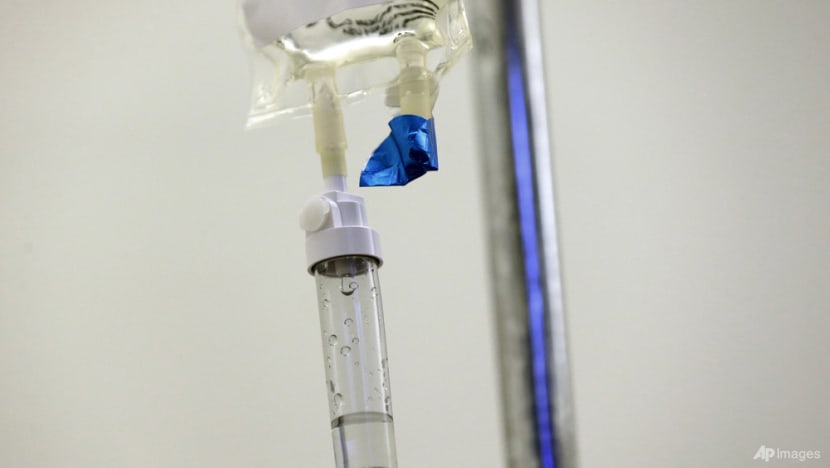Cancer was once thought to be a disease of the old. More young patients are dying from it now
Early-onset cancer deaths increased by 27.7 per cent between 1990 and 2019, while an estimated 20 million cases were diagnosed worldwide in 2022, according to a recent study.


This audio is generated by an AI tool.
WASHINGTON / SARDINIA, Italy: Just four months after giving birth to her son, Kelly Spill-Bonito was diagnosed with Stage 3 colorectal cancer.
To add to her devastation, the 28-year-old was told she would most likely never be able to conceive again.
“Cancer, I feel, (is like) death … and then I looked at my son and I thought, ‘I need to be here for you’,” she told CNA.
The American is among a growing number of people worldwide with early-onset cancers, defined as those under 50.
A recent study published in the BMJ Oncology medical journal showed the proportion of such patients rising by about 79 per cent from 1990 to 2019 – and the trend shows no signs of letting up.
Recent scientific breakthroughs are now helping to fight what was once considered a disease of the old.
CLINICAL TRIAL WAS NEW LIFELINE
For Spill-Bonito, now 31, she jumped at the chance to undergo a clinical trial for a drug which could activate her immune system to fight the cancer without the need for surgery, chemotherapy or radiation.
She was treated at Memorial Sloan Kettering Cancer Center in New York – the first hospital in the United States to open a centre specifically for young onset colorectal cancer patients.
“We're asking about risk factors, exposures, diet changes, antibiotic use, other things that we were thinking about that have changed throughout this time,” said Dr Robin Mendelsohn, co-director of the facility’s Center for Young Onset Colorectal and Gastrointestinal Cancers.
“I think in the end, it's probably not going to be one thing because I think we would have figured it out by now and it's probably a combination of factors together,” she added.
By the ninth round of treatment, doctors told Spill-Bonito that her disease had completely disappeared.
The treatment not only saved her life, but gave her a future.
Against all odds, she gave birth again – this time to a daughter – a year ago.
“I didn't want to let her go, like, ever. I could cry right now just thinking about it – and it didn't only change my life, it impacted my husband's life, my son’s,” she said.
“So going on this clinical trial – it's completely changed all of our lives.”
MORE DYING FROM EARLY-ONSET CANCER
However, an increasing number of young people are not beating their diagnoses.
Early-onset cancer deaths rose by 27.7 per cent between 1990 and 2019, according to the BMJ Oncology study.
An estimated 20 million cases of cancer were diagnosed worldwide in 2022, up from 18 million in 2020. Earlier this year, the World Health Organisation predicted that such cases would rise by 77 per cent to 35 million by 2050.
Healthcare facilities like the Johns Hopkins Sibley Memorial Hospital in Washington DC are becoming busier because of this.
Its director of medical oncology, Dr Ben Levy, opined that within the next decade, patients would be able to simply consult their primary care physician for a blood test to tell if they have cancer or find out their risk.
“You couple that with something like artificial intelligence, where you're able to do a blood test or even a scan, adding in the layers of artificial intelligence, and maybe it becomes more accurate,” added the lung cancer specialist.
COULD BLUE ZONES HELP TO IMPROVE HEALTH?
With a global rise in early and childhood cancer cases, people are also increasingly looking to the world’s so-called Blue Zones to find out how to prevent getting sick and lead longer lives.
Popularised by New York Times bestselling author Dan Buettner, a Blue Zone is a region with a high concentration of centenarians or 100-year-olds. These are places where people live longer and enjoy better health well into old age.
In his book The Blue Zones, Buettner named five original Blue Zones – Okinawa in Japan, Sardinia in Italy, Ikaria in Greece, Loma Linda in California, and the Nicoya Peninsula in Costa Rica.
At the small town of Seulo on Sardinia island, almost half of the babies born there in 1922 lived until at least 90 years old.
Seulo – termed “an island within an island” by locals – has nearly 10 times more centenarians per capita than the US, according to the Blue Zones website.
Residents are also culturally isolated, keeping to a traditional and healthy lifestyle that involves hunting, fishing and harvesting the food they eat.
On the Italian mainland, a vast experiment known as the Molisani Study has found clear evidence of the benefits of a Mediterranean diet that is packed with fruits, vegetables, whole grains and healthy fats and oils.
“We have seen that people who even after a diagnosis of cancer continued or reported a good adherence to the Mediterranean diet over the years had a significant reduction in the risk of dying not only for all causes but also, in a more specific way, from tumours,” said Dr Marialaura Bonaccio, a researcher in epidemiology at the Mediterranean Neurological Institute.
The original scientific research into Blue Zones has now mushroomed into a health trend, making Seulo a place of pilgrimage for those chasing a longer life.
Scientists believe a healthy diet, low stress, exercise and a tight-knit community are all key factors – a combination that has proven tough to replicate in big cities.
Seulo residents are clearly reaping the benefits of such a lifestyle.
One of them, Luigi Carta, turned 101 this year. He can often be found sitting by the roadside and chatting with others, including 93-year-old Antonello Lai.
“We used to work in the fields, eat natural foods and very little meat … Wine is very important!” he said.
















